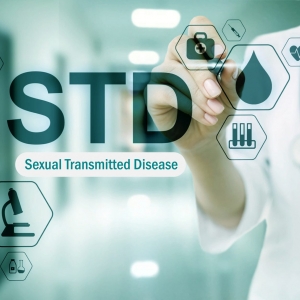Sexually Transmitted Diseases (STDs) are infections that are transmitted from one person to another through sexual activity, including vaginal, oral, or anal intercourse. Some STDs can be spread by other means, such as through blood transfusions, shared needles, or to a baby during childbirth. Understanding the different types of STDs can be challenging because early identification and treatment can help limit serious complications and long-term health issues.
According to the World Health Organization, every day across the world, people acquire more than 1 million STDs, and the majority of them have no symptoms. This fact shows how easily STDs can be passed from one person to another without knowing. Identifying STDs is a critical step toward better sexual health and health in general because STDs will have symptoms and effects on the body from STDs.
For someone who has possible exposure or symptoms that they may have an STD, visiting an urgent care clinic, or simply going to an urgent care level of service may expedite the testing and diagnosis process with their associated treatment.
Major Categories of STDs
Bacterial STDs
Bacterial STDs are caused by bacteria and can often be effectively treated with antibiotics if diagnosed early. However, a delay in treatment can lead to serious complications on the reproductive system, or the body as a whole.
- Chlamydia. This is one of the common STDs. Chlamydia primarily affects the reproductive organs. It can lead to pelvic inflammatory disease (PID) and infertility if not treated, especially in women.
- Gonorrhea. This infection can be found in the genitals, throat, or rectum. Symptoms most note include pain when you urinate, and discharge that is abnormal. In more severe cases, the infection can spread to your joints or blood.
- Syphilis. This infection is most dangerous; it has stages that continue to worsen without treatment, beginning with painless sores and rashes, progressing to damage to the internal organs or to the nervous system.
If you are showing any of these symptoms, please seek medical attention at any near me urgent care services for antibiotic testing and treatment.
Viral STDs
Viral STDs are caused by viral pathogens and cannot be fully treated. However, treatment can help you manage symptoms and reduce spreading it to others.
HIV/AIDS: HIV attacks and weakens your immune system and makes you more susceptible to other infections. Untreated, HIV can progress to where you develop AIDS, which can be deadly for some people.
Herpes (HSV-1 & HSV-2): The herpes simplex virus causes painful sores here or blisters around the mouth or in the genital area. The valuable aspect of herpes is that the virus will remain in your body permanently. Therefore, herpes is a lifelong viral infection, however, herpes can be treated fairly easily with medications, but flares may occur with further stress or illness.
Human Papillomavirus (HPV): HPV is the most common viral STI. It is frequently related to genital warts; however, it can also cause cervical cancer as well. There is an available vaccination to prevent high-risk strains of the virus.
Hepatitis B & C: These viruses attack your liver, and without treatment, hep B and C virus causes inflammation which can result in chronic liver disease, cirrhosis or cancer.
With continued monitoring, clinical care and medications by urgent health care practitioners anyone who has a viral STD can be evaluated and treated successfully.
Parasitic STDs
Parasitic infections stem from tiny organisms or insects residing on human skin or hair, and they spread through close contact, including sexual contact.
Trichomoniasis: this STD is caused by a parasite called Trichomonas vaginalis, characterized by genital itching, unusual discharge, or pain during urination or intercourse.
Pubic lice (crabs): these tiny parasites live in the hair of the body and feed on blood, leading to itching or irritation of the skin.
Scabies: scabies are tiny mites that burrow into the skin, causing severe itching and rashes, often worsening at night.
These infections can be treated with topical or oral medications. Please visit an urgent care clinic near me to get quickly diagnosed and treated.
How STDs Affect Different Parts of the Body
|
System Affected |
Examples of STDs |
Main Effects / Complications |
Severity if Untreated |
|
Reproductive System |
Chlamydia, Gonorrhea |
Infection of reproductive organs, pelvic inflammatory disease (PID), infertility, pregnancy complications, transmission to newborn |
High — can cause permanent reproductive damage and neonatal infections |
|
Immune System |
HIV (Human Immunodeficiency Virus) |
Weakens immune defenses, increases vulnerability to other infections and cancers |
Very High — leads to AIDS and life-threatening infections |
|
Skin and Mucous Membranes |
Herpes (HSV), Syphilis, HPV (Human Papillomavirus) |
Sores, rashes, lesions on skin and mucous membranes; visible warning signs |
Moderate to High — may cause chronic outbreaks or cancer (HPV) |
|
Liver and Other Organs |
Hepatitis B, Hepatitis C, Advanced Syphilis |
Chronic liver infection, cirrhosis, liver cancer, damage to brain, heart, and nervous system |
Very High — can lead to organ failure or death |
Prevention and Early Detection
Safe Sex Practices
The best way to reduce risk is to practice safe sex. Always use condoms or dental dams as part of sexual activity and minimize the number of sexual partners. Likewise, it is important to commune with your partner about sexual health.
Vaccinations
There are vaccinations available to reduce the chances of acquiring some viral STDs. For example, the HPV vaccine can make a person immune to the specific strains of HPV that cause cancer and warts. In addition, the vaccine for Hepatitis B can immunize a person against one of the principal contributors of liver disease.
Conclusion
When you understand the different types of STDs and the effects of each, you can feel empowered in controlling their sexual health choices. Prevention starts with early detection, safe practices, and vaccinations. Peace of mind and timely treatment can be guaranteed by utilizing rapid care, a local urgent care service near me, to ensure regular visits for testing.
With knowledge and the encouragement to communicate openly, we can collectively eliminate stigma, transmission of infection, and create a healthy educated community. Your health matters do not wait until symptoms show. Call urgent care Santa Clarita to make an appointment today for confidential and professional care.







